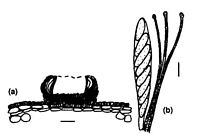|
 Cashiella sticheri Cashiella sticheri
BiostatusPresent in region - Indigenous. Endemic
Images (click to enlarge)
Caption: FIG. 3. Cashiella sticheri. (a) Vertical section of an apothecium (bar = 100 µm); (b) Ascus and paraphyses (bar = 10 µm). |
Article: Gadgil, P.D.; Dick, M.A. (2000) [1999]. Fungi silvicolae novazelandiae: 2. New Zealand Journal of Forestry Science 29: 440-458.
Description: Apothecia black, cup-shaped, finally patelliform, sessile but narrowed at the base, gregarious,
seldom solitary, circular in outline, glabrous, 300-500 µm in diameter. Excipulum
pseudoparenchymatous, composed of dark brown cuboid, thin-walled cells arranged in
irregularly radiating rows. Inner wall of apothecium of brown to hyaline parallel hyphae.
Asci not numerous, clavate, 50-65 x 8-12 µm. Ascospores uniseriate, ellipsoid, hyaline,
finally pale brown, 0-septate, straight, 15-18 x 6-8 µm. Paraphyses numerous, filiform,
joined together at the base but divergent later, dark brown, apices sub-globose; the apices of
the paraphyses join together to form an epithecium.
Notes: Only two other species of Cashiella have been described. The main morphological characters
of these and the new species are given in Table 5.
This fungus was found in a patch of about 1 ha where dieback of S. cunninghamii was
occurring. It is unlikely that C. sticheri was responsible for the condition as it was not
consistently associated with plants suffering from dieback.
Article: Gadgil, P.D. (in association with Dick, M.A.; Hood, I.A.; Pennycook, S.R.) (2005). Fungi on trees and shrubs in New Zealand. Fungi of New Zealand. Ngā Harore o Aotearoa 4: xi + 437 p. Hong Kong: Fungal Diversity Press.
Description: Type: Foliicolous Fungi; Description: Ascomata apothecial, in groups, seldom solitary, sessile, cup-shaped but narrowed at the base, circular in outline, disc concave to flat, black, 0.3–0.5 mm in diameter; on fern fronds. Asci not numerous, clavate, 50–65 × 8–12 μm. Ascospores ellipsoid, 0-septate, 15–18 × 6–8 μm, hyaline, finally becoming light brown. Paraphyses dark brown, with apices joined together to form an epithecium.
Distribution: Distribution: Wellington.; 1st Record: Gadgil & Dick (2000b).
|